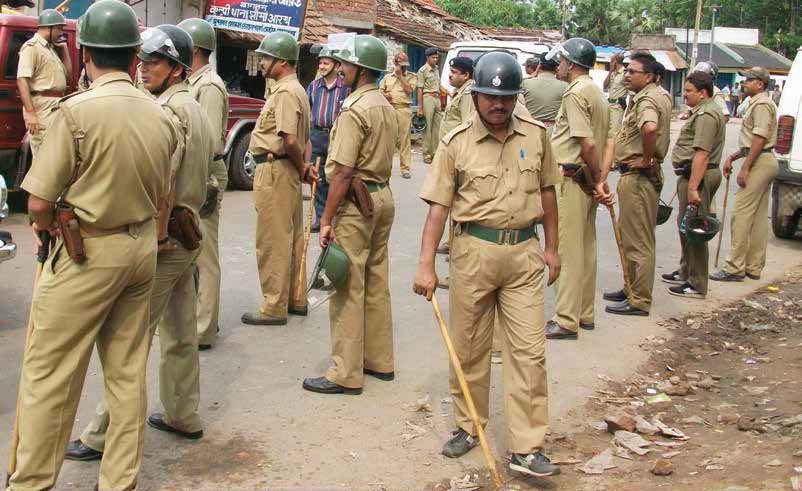This article is written by Varchaswa Dubey from JECRC University, Jaipur. This article reflects the critical analysis of certain provisions under CrPC, furthermore, the article also highlights the issue of misuse of laws under the Indian Penal Code, 1860.
Introduction
It is a common conception that most of the laws administering the criminal justice system of India are women-centric, and they provide special assistance and protection to women, and up to a certain extent, this concept is correct and genuine to protect women from evils of the society.
Some laws in India are women-centric because women continue to be major victims in the society, including rape, dowry death, cruelty by husband and other family members of husband, molestation, eve-teasing, etc. and therefore it is the need of the hour to protect the women, however, these laws are numerous times used as a weapon against males to take revenge, and this misuse of law is a major concern in India.
The Code of Criminal Procedure, 1973 (CrPC) is the criminal procedural law, which governs the due process of law, and how things shall be done. The 1973 legislation provides with the legal procedure established by law relating to the prosecution, trial, and punishment of the offenders.
How are laws under CrPC a threat to women
Arrest
Section 46 of CrPC in its exception clause states that no woman shall be arrested after sunset and before sunrise, however, it also provides with an exception to such right regarding arrest that, a woman police officer shall, after making a written report, and after obtaining written permission by judicial magistrate first class who have local jurisdiction of such offense, may make an arrest. Once a woman is arrested, she will be kept in police custody during the night, and such circumstances are a threat to a woman. Instead of putting a woman in the police station until she is presented before the concerned magistrate the next day, such a woman should be kept in places like an NGO, or a Mahila police station where there is no male present, including the staff of the NGO and police officers.
Investigation and trial
Section 177 of CrPC reserves provisions regarding the place of ordinary inquiry and trial of an offense. In cases of rape, the statement of the victim is recorded under Section 164A of CrPC, however, in cases of a victim being below the age of 18 years, there are no separate legal provisions. A victim below the age of 18 years is very likely to turn hostile, and therefore, an amendment to record the statement of the victim below the age of 18 in the presence of her parents or guardian shall be introduced. Section 26 of CrPC states that any offense relating to rape under the Indian Penal Code, 1860 shall be tried as far as possible by a court presided over by a woman. The provision exists on the theory that a woman is more comfortable in telling the facts of the case to other women, as compared to a male judge, which safeguards the interests of female victims of rape and assists delivery of justice.
Section 167 of CrPC which deals with the procedure when investigation cannot be completed in twenty-four hours states that in case of a woman under eighteen years of age, the detention shall be authorized to be in the custody of a remand home or recognized social institution. However, the remand homes are also not safe for women as women not only run away from remand homes leading to gang rape but women are also getting raped in the remand homes as well, leading to major loopholes concerning the protection of women. Such incidents reflect the clear scenario of current government administration, and of remand homes that are specially established for the protection of women.
Section 309 of CrPC is concerned with the power to postpone or adjourn proceedings especially in cases of rape where the inquiry or trial shall be completed within two months from the date of filing of the charge sheet, yet there is a case of gang rape where police took more than 2 decades to arrest the prime accused. Strict compliance in the cases of rape, murder, and abduction is necessary to meet the ends of justice.
Domestic violence
Section 198A of CrPC states that no court shall take the cognizance of an offense concerning a domestic matter, except when a police report of facts is filed which contains the complaint made by the relatives of the victim. This provision is bestowed to protect the interests of a woman and to safeguard her marriage. Section 498A of the Indian Penal Code, 1860 is the most significant legal provision here which prosecutes the husband and other family members of the husband when they practice cruelty on a woman. This procedural law has its drawbacks including, if the police fail to entertain the complaint of the victim of cruelty or her relatives, or if the police are indulged in taking bribes from the accused or the family members of the accused, which the police most of the time does, then no cognizance of cruelty can be filed leading to injustice to the victim and her family members.
Maintenance
Section 125 of CrPC is the primary piece of legislation concerned with providing maintenance to wives, children, and parents. Considered as one of the most secular laws ever in the country, Section 125 of CrPC provides with the compulsion of maintaining the wife of the accused, if such wife is unable to maintain herself. This provision is bestowed to protect women in society. However Section 125 of CrPC is the only application in cases where the marriage is lawful under personal laws of the concerned parties, and this has led to many women abandoning their right to maintenance, as most of the time they were kept in the dark regarding the other marriage.
In the case of Smt. Yamunabai Anantrao Adhav A v. Ranantrao Shivram Adhav (1988) The Supreme Court of India held that a marriage which is not in accordance with the Hindu rites with the husband who already has a legal spouse, by virtue of Hindu Marriage Act, 1955 is invalid and null in the eyes of law and therefore the second wife is not entitled to the benefit of Section 125 of CrPC. The main dispute is, why the second wife is not entitled to the benefit of Section 125 CrPC, even though she was kept in the dark about the first marriage, and her rights are also violated in such circumstances, therefore, new provision regarding the maintenance or any other compensation to the second wife shall be introduced in the definition of Section 125 CrPC.
How some women misuse laws
The women-centric laws have made a tremendous achievement in the field of protection and safeguarding the rights of women in India, however, the very laws on the other hand are also used as a weapon against men sometimes to seek revenge, and therefore there is an urgent need to curb the fake cases against men since they are equally entitled to fundamental rights enshrined in the Constitution of India.
While some argue that Women’s protection laws should be amended to eliminate misuse of laws and to safeguard innocent masculinity, others are of the view that we haven’t reached the point where men need protection from women.
Section 498A of Indian Penal Code, 1860
Section 498A is the most abused legal provision enshrined in the Indian Penal Code, 1860. The legal provision was made to prevent dowry deaths in India. Section 498A was added by the Criminal Law (Amendment) Act, 1983 (Act 43 of 1983), and with the same objective Section 113A of Indian Evidence Act, 1872 was also added.
In the case of Saritha vs R. Ramachandra (2002) the Supreme Court of India held that educated women are approaching courts for divorce and initiating proceedings against their in-laws under Section 498-A of IPC, which is nothing but abuse of beneficial provisions which were bestowed to protect women from the cruelty of their husbands but it has taken a reverse approach now.
In the case of Anju vs Govt. Of Nct Of Delhi &Ors (2019), the Apex Court observed that the petitioner in the present case has named all the family members of the accused in one go, without actually mentioning their specific roles, and has failed to give any evidence regarding the changes concerned with Section 498A of IPC, and has also failed to give rise to any suspicion as well.
A similar view was taken by the court in the case of Bhupinder Kaur And Ors. vs the State Of Punjab And Ors (2003) where the complainant wife first filed a false FIR against all the family members of her husband and then later initiated a fake case under Section 498A of IPC. The court held that every member of the family of the husband has been implicated in this case and the initiation of criminal proceedings against all of them is a case of abuse of process of the court.
According to an NCRB report, out of 99,135 cases in the year 2012 concerning the offense of Section 498A of IPC, 10193 cases were reported to be fake on the grounds of mistake of fact or law.
Report of Law Commission of India
The Law Commission of India in its Report No. 243 on Section 498-A of IPC while considering suggestions of specific provisions to punish women who are involved in filing false complaints about irrelevant reasons ruled that there is no reason to make a special provision for Section 498A, and the existing legal provisions like Section 182 and Section 211 of IPC and Section 250, Section 358 of CrPC are sufficient.
Section 376 of Indian Penal Code, 1860
Section 376 of IPC lays down the punishment for rape, with a minimum of ten years of imprisonment to life imprisonment, and a fine, while the definition of rape is laid down in Section 375 of IPC.
Rape is the most gruesome crime against a woman and society overall, and the consequences of rape continue to haunt society forever. The offense of rape is the most worrying concept in India, with an average of 87 rape cases daily, India continues to be one of the most dangerous countries in the world for women.
However, there is an increase in the trend of filing fake rape cases against men, sometimes out of anger, and sometimes under pressure from relatives. In most fake rape cases, sexual intercourse is consensual but later, the woman files a rape case either to seek revenge, or out of jealousy, or anger, which leads to ruining of the whole life of the accused even if he is later found to be innocent. According to the Delhi Commission of Women report between April 2013 and July 2014, of the 2,753 complaints of rape, only 1,287 cases were found to be true, and the remaining 1,464 cases were found to be false in the NCR region.
In the case of Mohit Nagar vs State & Anr (2017) the complainant woman argued before the court that she was indulged in consensual sexual intercourse on the pretext of marriage, however the woman was already married to another person, and all her arguments were false. The court observed that the woman has already filed other similar cases, and the court quashed the criminal proceedings against the accused.
In the case of Vineet Kumar And Ors vs State Of UP (2017), the wife of the petitioner argued before the court that his wife was gang-raped by the accused persons in their own house, however, the court found no evidence to such allegations, furthermore, the alleged victim also refused any medical examination due to delay of time. The case later turned out to be a case of revenge, as the alleged victim, her husband, and her son owed a certain amount of money to the accused.
Conclusion
It is evident from the above study that the Indian legal mechanism is certainly lacking the enforcement of the laws, also certain legal provisions in the criminal procedural law in India highlighted above are vague, and a threat to women in this country, therefore, the Parliament of India should urgently consider these loopholes, to protect the interests of women in this country and also to eliminate misuse of laws by introducing new laws, so that not only the resources of the court but also the abuse of provisions under CrPC be eliminated.
References
- https://www.cwds.ac.in/wp-content/uploads/2016/12/ca_Women_and1.pdf
- https://www.livelaw.in/news-updates/bring-suitable-amendment-in-women-protection-laws-147254
- https://blog.ipleaders.in/misuse-section-498a-ipc/
- https://www.hellocounsel.com/misuse-of-women-centric-laws-in-india/
Students of Lawsikho courses regularly produce writing assignments and work on practical exercises as a part of their coursework and develop themselves in real-life practical skills.
LawSikho has created a telegram group for exchanging legal knowledge, referrals, and various opportunities. You can click on this link and join:
https://t.me/joinchat/J_0YrBa4IBSHdpuTfQO_sA
Follow us on Instagram and subscribe to our YouTube channel for more amazing legal content.
 Serato DJ Crack 2025Serato DJ PRO Crack
Serato DJ Crack 2025Serato DJ PRO Crack











 Allow notifications
Allow notifications


